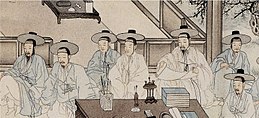| Jesa | |||||||||||
|---|---|---|---|---|---|---|---|---|---|---|---|
 A Korean jesa spread (2005) | |||||||||||
| Chinese name | |||||||||||
| Chinese | 祭祀 | ||||||||||
| |||||||||||
| Korean name | |||||||||||
| Hangul | 제사 | ||||||||||
| Hanja | 祭祀 | ||||||||||
| |||||||||||
 |
| Part of a series on the |
| Culture of Korea |
|---|
| Society |
| Arts and literature |
| Other |
| Symbols |
|
Jesa (Korean: 제사, Korean pronunciation: [tɕe.sa]) is a ceremony commonly practiced in Korea. Jesa functions as a memorial to the ancestors of the participants.[1] Jesa are usually held on the anniversary of the ancestor's death. The majority of Catholics, Buddhists and nonbelievers practice ancestral rites, although Protestants do not.[2] The Catholic ban on ancestral rituals was lifted in 1939, when Pope Pius XII formally recognized ancestral rites as a civil practice (see Chinese Rites controversy).[2] Many Korean Christians, particularly Protestants, no longer practice this rite.[3][4] Christians generally avoid the rites,[5][6] and many emigrants avoiding the rites.[7]
Since their origins, Jesa has taken on a certain formality as human civilization has developed, which is sometimes called rituals in Confucianism.[8]
- ^ "National Folk Museum of Korea - 영어 > Collection > Folk story > Traditional Rites and Rituals > What is Jesa (Ancestral Rite)?". www.nfm.go.kr. Retrieved 2023-02-13.
- ^ a b Park, Chang-Won (10 June 2010). Cultural Blending in Korean Death Rites. Continuum International Publishing Group. pp. 12–13. ISBN 978-1-4411-1749-6.
- ^ Suh, Sharon A. (2004), Being Buddhist in a Christian World: Gender and Community in a Korean American Temple, University of Washington Press, p. 49, ISBN 0-295-98378-7
- ^ Kwon, Okyun (2003). Buddhist and protestant Korean immigrants: religious beliefs and socioeconomic aspects of life. LFB Scholarly Publishing LLC. pp. 137–138. ISBN 978-1-931202-65-7.
- ^ 지금은 다른 종교를 믿을 수 있기 때문에 굳이 제사를 통해 영생을 찾을 필요도 없다.
- ^ 개신교에서는 제사 대신 추도예배를 드린다
- ^ 이민간 나라의 풍습에 따라서 제사 의식이 없는 나라가 있다.
- ^ 하늘을 제사한 환구단 병풍과 제기 공개 2015-05-04